六年级英语下册知识点
六年级下册英语第四单元知识点

六年级下册英语第四单元知识点一、单词。
1. 形容词。
- dining hall(饭厅、食堂):这是一个合成名词,dine是“进餐”的意思,hall是“大厅”,合起来就是吃饭的大厅。
- gym(体育馆):是“gymnasium”的缩写形式,注意发音为/dʒɪm/。
- grass(草坪):不可数名词,例如:There is a lot of grass on the playground.(操场上有很多草。
)- cycling(骑自行车运动):是cycle(骑自行车)的动名词形式,常用于表达与骑自行车相关的活动,如:I like cycling very much.(我非常喜欢骑自行车。
)- badminton(羽毛球运动):是一项体育运动的名称,例如:We play badminton every Sunday.(我们每个星期天打羽毛球。
)2. 短语类单词。
- go cycling(去骑自行车):这是一个动词短语,go后面接动名词形式,表示进行某项活动。
- ice - skate(滑冰):ice是“冰”,skate是“滑冰”的意思,这是一个动词,例如:I can ice - skate in winter.(我在冬天会滑冰。
)二、句子。
1. There be句型。
- There was no library in my old school.(我以前的学校没有图书馆。
)- There were no computers or Internet in my time.(在我那个时候没有电脑也没有互联网。
)- 注意:There be句型表示“某地有某物”,be动词的形式要根据后面的名词单复数来确定。
如果后面是可数名词单数或者不可数名词,就用is/was;如果是可数名词复数就用are/were。
在这两个句子中,library是可数名词单数,所以用was;computers是可数名词复数,所以用were。
六年级下册英语第一二单元知识点
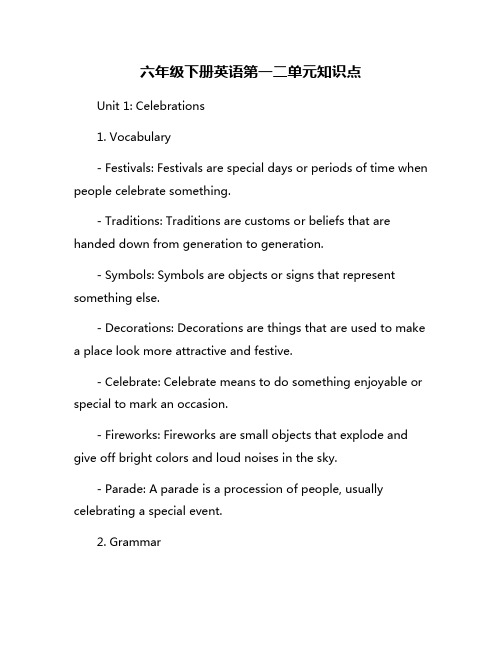
六年级下册英语第一二单元知识点Unit 1: Celebrations1. Vocabulary- Festivals: Festivals are special days or periods of time when people celebrate something.- Traditions: Traditions are customs or beliefs that are handed down from generation to generation.- Symbols: Symbols are objects or signs that represent something else.- Decorations: Decorations are things that are used to make a place look more attractive and festive.- Celebrate: Celebrate means to do something enjoyable or special to mark an occasion.- Fireworks: Fireworks are small objects that explode and give off bright colors and loud noises in the sky.- Parade: A parade is a procession of people, usually celebrating a special event.2. Grammar- Present simple tense: We use the present simple tense to talk about general truths, habits, and routines.- Adverbs of frequency: Adverbs of frequency tell us how often something happens. Some examples are always, usually, often, sometimes, and never.3. Reading and Writing- Reading comprehension: Reading comprehension is the ability to understand and interpret a text.- Writing a diary entry: A diary entry is a personal record of daily events and experiences.Unit 2: Nature1. Vocabulary- Habitat: A habitat is the natural environment where an animal, plant, or organism lives.- Endangered: If a species is endangered, it is at risk of becoming extinct.- Eco-friendly: Eco-friendly means not harmful to the environment.- Pollution: Pollution is the presence of harmful substances in the environment.- Extinct: Extinct means that a species no longer exists.- Conservation: Conservation is the protection and preservation of natural resources.2. Grammar- Modal verbs: Modal verbs are auxiliary verbs that express possibility, necessity, ability, permission, or obligation.- Comparatives and superlatives: Comparatives are used to compare two things, while superlatives are used to compare three or more things.3. Reading and Writing- Descriptive writing: Descriptive writing describes a person, place, or thing in detail.- Writing a persuasive text: Persuasive writing aims to convince the reader of a certain point of view or a call to action.In summary, the first two units of the sixth-grade English textbook cover vocabulary related to celebrations and nature, as well as grammar points such as the present simple tense, adverbs of frequency, modal verbs, and comparatives andsuperlatives. Students also practice reading comprehension, writing diary entries, descriptive writing, and persuasive texts.。
英语六年级下册知识点公式
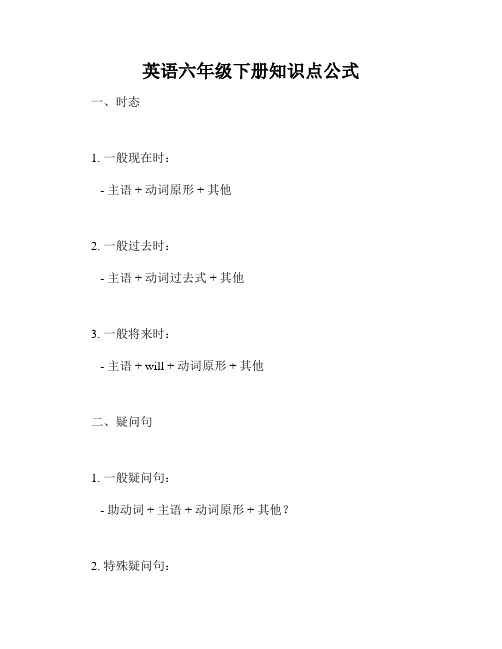
英语六年级下册知识点公式一、时态1. 一般现在时:- 主语 + 动词原形 + 其他2. 一般过去时:- 主语 + 动词过去式 + 其他3. 一般将来时:- 主语 + will + 动词原形 + 其他二、疑问句1. 一般疑问句:- 助动词 + 主语 + 动词原形 + 其他?2. 特殊疑问句:- 疑问词 + 助动词 + 主语 + 动词原形 + 其他?三、否定句1. 一般现在时否定句:- 主语 + do not/does not + 动词原形 + 其他2. 一般过去时否定句:- 主语 + did not + 动词原形 + 其他3. 一般将来时否定句:- 主语 + will not + 动词原形 + 其他四、被动语态1. 一般现在时被动语态:- 主语 + am/is/are + 被动语态动词 + 其他2. 一般过去时被动语态:- 主语 + was/were + 被动语态动词 + 其他3. 一般将来时被动语态:- 主语 + will be + 被动语态动词 + 其他五、比较级和最高级1. 比较级的构成:形容词/副词 + -er + than/and + 内容2. 最高级的构成:the + 最高级形式 + 内容六、连接词1. 并列连接词:- and, but, or2. 转折连接词:- however, although, though3. 递进连接词:- moreover, furthermore, in addition七、名词复数形式1. 一般名词复数形式:- 单数名词 + -s2. 以s, x, ch, sh结尾的名词复数形式: - 单数名词 + -es八、形容词比较级和最高级形式1. 一般形容词比较级:- 形容词 + -er + than2. 一般形容词最高级:- the + 形容词最高级形式九、动词过去式和过去分词形式1. 一般动词过去式:- 动词原形 + -ed2. 一般动词过去分词形式:- 动词原形 + -ed十、冠词1. 不定冠词:- a/an2. 定冠词:- the以上是英语六年级下册的一些重要知识点公式,通过这些公式的掌握,可以有效提高英语学习的效果。
pep六年级下册英语知识点归纳总结

pep六年级下册英语知识点归纳总结一、单词拼写常见规律:1. 以e结尾的单词,变成复数形式时,先去掉e再加s;2. 以辅音字母+y结尾的单词,变成复数形式时,先把y变i再加es;3. 以o结尾的单词,变复数形式时,大部分直接加es。
二、基数词和序数词1. 基数词:表示数量的词,例如:one, two, three等;2. 序数词:表示顺序的词,例如:first, second, third等。
三、时态1. 一般现在时:表示经常发生的动作或客观事实;2. 一般过去时:表示过去发生的动作或状态;3. 一般将来时:表示将来发生的动作或计划。
四、句型结构1. 肯定句结构:主语+动词+宾语;2. 否定句结构:主语+do/does/did not+动词+宾语;3. 疑问句结构:特殊疑问词/助动词+主语+动词+宾语。
五、情态动词常见情态动词有can, could, may, might, must, shall, should, will, would等,它们用于表示推测、能力、许可、建议、命令等情态。
六、名词所有格1. 名词所有格:表示所属关系的名词后面加's;2. 表示复数名词所有格:在复数名词后面加';3. 表示以s结尾的复数名词所有格:在复数名词后面加'。
七、形容词和副词1. 形容词:修饰名词,通常放在名词前面;2. 副词:修饰动词、形容词和副词,通常放在所修饰的词后面。
八、比较级和最高级1. 比较级:表示两个或两组人或事物之间的比较,形容词和副词的比较级一般在词尾加er,例如:taller, faster;2. 最高级:表示三个或三组或三者以上的人或事物之间的比较,形容词和副词的最高级一般在词尾加est,例如:tallest, fastest。
九、倍数和分数1. 倍数:使用倍数词+as+形容词原级,例如:twice as heavy as;2. 分数:使用分数词+of+名词,例如:two-thirds of the students。
人教版六年级下册英语知识点
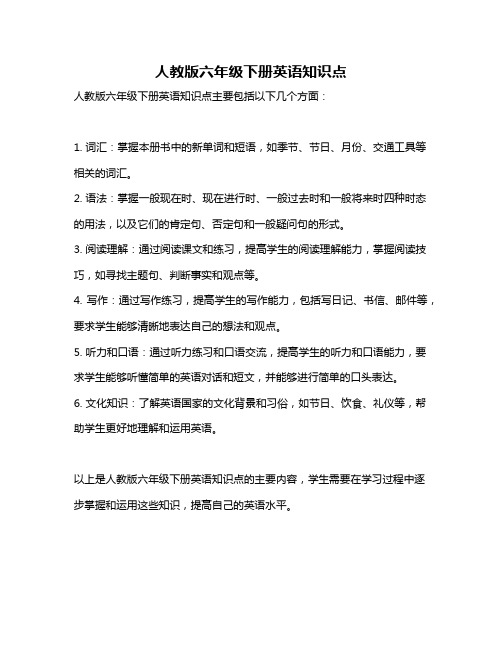
人教版六年级下册英语知识点
人教版六年级下册英语知识点主要包括以下几个方面:
1. 词汇:掌握本册书中的新单词和短语,如季节、节日、月份、交通工具等相关的词汇。
2. 语法:掌握一般现在时、现在进行时、一般过去时和一般将来时四种时态的用法,以及它们的肯定句、否定句和一般疑问句的形式。
3. 阅读理解:通过阅读课文和练习,提高学生的阅读理解能力,掌握阅读技巧,如寻找主题句、判断事实和观点等。
4. 写作:通过写作练习,提高学生的写作能力,包括写日记、书信、邮件等,要求学生能够清晰地表达自己的想法和观点。
5. 听力和口语:通过听力练习和口语交流,提高学生的听力和口语能力,要求学生能够听懂简单的英语对话和短文,并能够进行简单的口头表达。
6. 文化知识:了解英语国家的文化背景和习俗,如节日、饮食、礼仪等,帮助学生更好地理解和运用英语。
以上是人教版六年级下册英语知识点的主要内容,学生需要在学习过程中逐步掌握和运用这些知识,提高自己的英语水平。
人教版六年级下册英语知识点汇总

人教版六年级下册英语知识点汇总一、词汇1. 日常生活与社交•情感与态度词汇:happy, sad, angry, excited, surprised, worried 等。
•社交用语:invite, accept, refuse, apologize, congratulate, thank 等及其相关表达。
•节日与活动:Spring Festival, Mid-Autumn Festival, Christmas, birthday party, sports meeting 等。
2. 学校与学习•学习方法与策略:review, preview, note-taking, brainstorming 等。
•学科相关词汇:geography, history, biology, physics, chemistry(基础词汇)及学科活动。
3. 科技与未来•科技产品:computer, smartphone, internet, robot, AI 等。
•未来设想:space travel, environmental protection, renewable energy 等。
4. 旅行与交通•交通工具:plane, train, bus, subway, ship, bicycle 等。
•旅游景点与活动:museum, zoo, park, beach, hiking, camping 等。
二、语法1. 时态•熟练掌握一般现在时、一般过去时、现在进行时、一般将来时,并初步了解过去进行时和现在完成时的用法。
2. 语态•学习并理解被动语态的基本结构和用法。
3. 非谓语动词•初步接触动词不定式(to do)、动名词(doing)和分词(现在分词doing 和过去分词done)作为非谓语动词的用法。
4. 复合句•学习并列句和主从复合句(如宾语从句、状语从句、定语从句)的基本结构和用法。
三、句型与表达•能够根据语境运用多种句型进行表达,包括疑问句、祈使句、感叹句等。
六年级下册英语语法
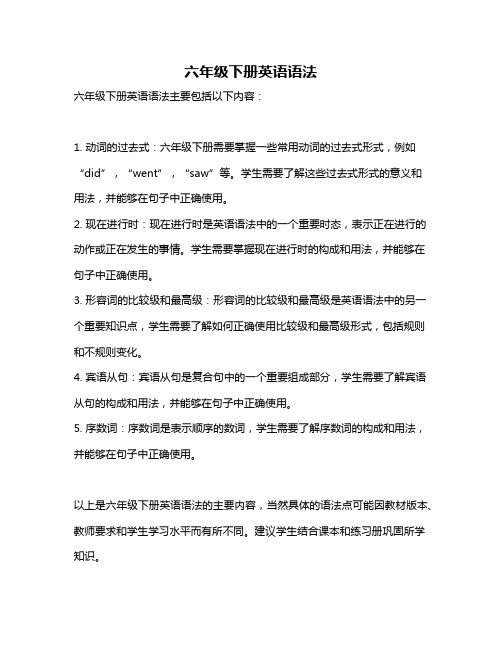
六年级下册英语语法
六年级下册英语语法主要包括以下内容:
1. 动词的过去式:六年级下册需要掌握一些常用动词的过去式形式,例如“did”,“went”,“saw”等。
学生需要了解这些过去式形式的意义和
用法,并能够在句子中正确使用。
2. 现在进行时:现在进行时是英语语法中的一个重要时态,表示正在进行的动作或正在发生的事情。
学生需要掌握现在进行时的构成和用法,并能够在句子中正确使用。
3. 形容词的比较级和最高级:形容词的比较级和最高级是英语语法中的另一个重要知识点,学生需要了解如何正确使用比较级和最高级形式,包括规则和不规则变化。
4. 宾语从句:宾语从句是复合句中的一个重要组成部分,学生需要了解宾语从句的构成和用法,并能够在句子中正确使用。
5. 序数词:序数词是表示顺序的数词,学生需要了解序数词的构成和用法,并能够在句子中正确使用。
以上是六年级下册英语语法的主要内容,当然具体的语法点可能因教材版本、教师要求和学生学习水平而有所不同。
建议学生结合课本和练习册巩固所学知识。
六年级下册第二单元英语知识点

六年级下册第二单元英语知识点一、重点单词。
1. 形容词。
- clean(干净的) - dirty(脏的)- healthy(健康的) - unhealthy(不健康的)- strong(强壮的) - weak(虚弱的)- happy(高兴的) - sad(悲伤的)2. 与生活习惯相关的名词。
- habit(习惯)- exercise(锻炼;练习)- sleep(睡觉)- junk food(垃圾食品)- vegetable(蔬菜)- fruit(水果)3. 频度副词。
- always(总是)- usually(通常)- often(经常)- sometimes(有时)- never(从不)二、重点短语。
1. 与健康生活方式相关。
- do exercise(做锻炼)- eat vegetables(吃蔬菜)- eat fruit(吃水果)- drink milk(喝牛奶)- go to bed early(早睡)- get up early(早起)- keep clean(保持干净)- wash hands(洗手)2. 表示频率的短语。
- once a day(一天一次)- twice a week(一周两次)- three times a month(一个月三次)三、重点句型。
1. 描述健康习惯。
- I often do exercise. It makes me strong.(我经常做锻炼。
它让我强壮。
)- She always eats vegetables. They are good for her health.(她总是吃蔬菜。
它们对她的健康有好处。
)2. 描述不健康习惯及影响。
- He sometimes eats junk food. It's bad for his body.(他有时吃垃圾食品。
这对他的身体有害。
)- They never go to bed early. So they are often tired in class.(他们从不早睡。
(完整版)六年级下册英语知识点总结

(完整版)六年级下册英语知识点总结六年级下册英语知识点总结第一单元(Unit1 How tall are you?)单词:tall—taller更高的short—shorter 更矮的strong—strong更强壮的old—older年龄更大的young—younger 更年轻的big—bigger更大的heavy—heavier 更重的long—longer 更长的thin—thinne更瘦的small—smaller 更小的dinosaur恐龙hall大厅metre,meter 米than比both 两个都kilogram千克,公斤countryside乡村low—lower更低的shadow阴影,影子smart—smarter更聪明的become开始变得,变成句子:1、That's the tallest dinosaur in this hall.那是这个厅里最高的恐龙。
2、You’re older than me. 你比我大。
3、How tall are you ?你有多高?I’m 1.65 metres.我身高1.65米。
4、What size are your shoes ?你穿多大号的鞋?5、My shoes are size 37. 我穿37号的鞋。
6 、Your feet are bigger than mine .你的脚比我的大。
7、How heavy are you ?你有多重?I’m 48 kilograms .我体重48公斤。
8、It’s taller than both of us togethe r .它比我们俩加在一起还高。
应该掌握的知识点:1、形容词变为比较级的变化规则:(1)一般情况下,在形容词的词尾直接加er。
如: tall—taller short—shorter.(2)以字母e结尾的形容词,在词尾直接加r,如:nice—nicer. late—later(3)以重读闭音节结尾,且结尾只有一个辅音字母的词,先双写这个辅音字母,再加er.如:big—bigger thin—thinner fat—fatter(4)以辅音字母加y结尾的双音节形容词,先变y为i , 再加er。
冀教版六年级下册英语知识点
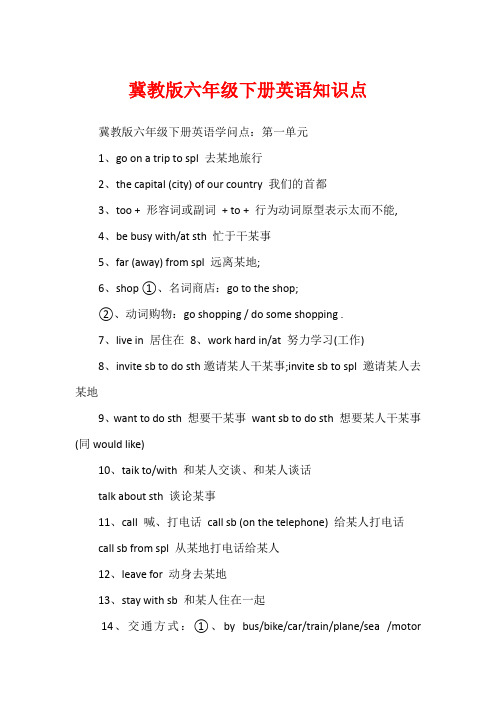
冀教版六年级下册英语知识点冀教版六年级下册英语学问点:第一单元1、go on a trip to spl 去某地旅行2、the capital (city) of our country 我们的首都3、too + 形容词或副词+ to + 行为动词原型表示太而不能,4、be busy with/at sth 忙于干某事5、far (away) from spl 远离某地;6、shop ①、名词商店:go to the shop;②、动词购物:go shopping / do some shopping .7、live in 居住在8、work hard in/at 努力学习(工作)8、invite sb to do sth邀请某人干某事;invite sb to spl 邀请某人去某地9、want to do sth 想要干某事want sb to do sth 想要某人干某事(同would like)10、taik to/with 和某人交谈、和某人谈话talk about sth 谈论某事11、call 喊、打电话call sb (on the telephone) 给某人打电话call sb from spl 从某地打电话给某人12、leave for 动身去某地13、stay with sb 和某人住在一起14、交通方式:①、by bus/bike/car/train/plane/sea /motorbike/boat/taxi②、on a bus/bike/train/plane/smotor bike/boat③、take a bus/bike/car/train/plane/ motor bike/boat/taxi④、其它:in a car/ boat/taxi ; on foot ; ride a bike .15、may I?确定答复:Yes, you may /Yes,please /Yes,of course /Sure .否认答复:No, you may not /no,you can`t /No,you mustn`t .16、plan 名词打算:make a plan for sth 为某事制定打算;动词打算:plan (for) sth为某事做打算;plan to do sth 打算干某事.17、need to do sth :须要去作某事;18、tell sb about/of sth :告知某人关于某事.19、go back to spl 回到某地20、pack A with B :把B打包放进A中Xiao is packing her bag with her books .21、给某人写信:write to sb / write sb a letter / write a letter to sb ;22、a suit of clothes 一套衣服.23、a pair of shoes 一双鞋子; two pairs of glasses 两副眼镜;留意:pair短语在句中假如作主语,应依据pair的单复数确定谓语动词的单复数.24、Have a good trip ! 旅途开心!冀教版六年级下册英语学问点:其次单元1、argue with sb about sth 因某事和某人争辩2、get on 上车get off 下车3、be ready for sth 为某事做打算4、a ticket to Canada去加拿大的票5、in +某种语言用某种语言speak+某种语言说某种语言6、pardon me 对不起、请重复一遍=Excuse me7、have to(客观的必需) =must(主观上的必需) 必需、不得不、必须得8、look out of 从向外看out of sth 某物的外面9、here and there 到处、四处10、point to 指向point at指着point out 指出11、at the top of 在的顶端at the bottom of在的底部12、try to do sth 努力、设法干某事13、be from spl = come from spl 来自某地14、of course / Sure / Ok 当然16、place of interest /the interesting place 名胜古迹17、enjoy doing sth 喜爱干某事18、hope to do sth 盼望干某事hope+宾语从句盼望19、Its time for sth / Its time to do sth / Its time for sb to do sth 该干某事的时候了20、wait for sb/sth 等待某人、某物wait for (sb) to do sth 等待(某人)干某事21、find out 查出、查明fing sb doing sth 发觉某人正在干某事22、feel+形容词/ be +形容词:感觉怎么样23、a bowl of /a bottle of /a glass of /a cup of / a can of pop 一碗/ 一瓶/ 一杯/ 一听汽水24、be quiet 静谧keep quiet 保持静谧25、play a word game 玩一个单词嬉戏play with sb 和某人一起玩play with sth 玩弄某物如:Dont play with fire ! 不要玩火!play +球类名词(不要the) play+the +乐器名词(必需要the)如:play the piano26、watch TV / a football match / a movie see a flim 看电影read the book / the newspaper27、show sb sth=show sth to sb 给某人看某物28、take care of = look after 照看、照料、照看29、look for 找寻冀教版六年级下册英语学问点:第三单元1、Let sb do sth 让某人干某事2、I speak good English = I speak English well .我英语讲得好.3、translate for sb 为某人翻译4、laugh at sth 讪笑某人fly a kite / fly kites 放风筝5、have fun 玩得开心have fun (in) doing sth 干某事玩得很快乐6、make fun 开玩笑7、hurt ones +身体部位:hurt my nose / hurt my arm .8、Dont be afraid . 不要胆怯Dont worry . 不要担忧9、be careful / look out 当心、留神10、worry about sth /sb be worried about sth /sb 担忧某物/ 某人11、put on 把放在上putin 把放进里面put down把放在下面12、take ones picture 给某人照相take a picture /take pictures照相13、用with + 详细工具如:She write a letter to her friends pen .by 通过某种方式She sends messages to her friends postcard14、fall off 从上掉下来15、help sb do sth / help sb with sth协助某人干某事16、at the post office 在邮局17、break his tail 折断了他的尾巴18、at the traffic lights 在交通灯的地方19、There be + sb +动词ing 形式+地点(介词短语) 某处有某人正在干某事20、on the left 在左边on the right 在右边21、on the postcard 在明信片上22、in the top、right corner of sth 在的右上角23、go straight down 沿着直走24、in an hour 一个小时以后25、write sb a letter / write a letter to sb / write to sb给某人写信26、a pair of chopsticks 一双筷子27、send sb sth /send sth to sb给某人寄(送)某物28、buy sb sth / buy sth for sb 给某人买某物29、be late for sth 干某事迟到30、turn left向左转turn right向右转31、begin/start to do sth /begin/start doing sth 起先干某事32、a gift for sb 给某人的礼物33、a kind of 一种all kinds of 各种各样的34、A man who has not climbed the Great Wall is a true man .35、see sb doing sth 望见某人正在干某事(动作正在进展)see sb do sth 望见某人干了某事(动作发生的过程)36、很多many +可数名词much+不行数名词a lot of lots of37、一点、a little +不行数名词一些a few +可数名词some 用于确定句any用于否认句和疑问句38、put on 穿上、戴上(穿的动作) wear 穿着、戴着(穿的状态)39、turn on 翻开9、turn up 调大turn off 关闭turn down 调小40、停顿干某事stop to do sth 停下来去做另外一件事stop doing sth 停顿正在干的事41、在的前面in front of 在(室外)没有局限空间的地方的前面in the front of 在(室内)有限空间的地方的前面猜你感爱好的:1.冀教版小学六年级下册英语总复习资料2.冀教版六年级英语下册复习要点3.冀教版六年级下册英语复习重点句子4.冀教版六年级下册英语复习资料5.冀教版六年级英语重点句子复习资料。
六年级下英语知识点总结(优秀)

六年级下英语知识点总结(优秀)六年级下册英语知识点复习总结篇一①playbadminton打羽毛球②alwaysdoyourhomework总是做家庭作业③drythedishesaftersupper晚饭后擦干盘子④atthesportsstore在运动品专卖店⑤makelunch做午饭⑥lastweek上周⑦before/afterbreakfast⑧onceayear一年一次⑨wakeup起床动词原形及过去式buy----bought(买)teach----taught(教)think----thought(想)win-----won(赢)do----did(做)lose----lost(丢失)throw----threw(扔)swim----swam(游泳)have----had(有)lie-------lay(躺)say------said(说)forget-----forgot(忘记)begin------bagin(开始)bring-----brought(带来)eat----ate(吃)go-----went(去)isam-----wasare-----were六年级英语知识点大总结篇二六年级英语知识点大总结Unit1 How can I get there?key words(重点单词)museum 博物馆 postoffice 邮局bookstore 书店 cinema 电影院hospital 医院 restaurant 餐馆crossing 十字路口 turn left/ right 左转go straight 笔直走 map 地图next to 与。
相邻 near在。
附近key sentence patterns (重点句型)1. Where is the cinema? 电影院在哪?2. It’s next to the bookstore.它紧邻书店。
3. How can I get there? 我怎样到那儿?4. Turn left at the bookstore. 在书店左转。
六年级下册英语知识点公式

六年级下册英语知识点公式一、单词记忆公式在六年级下册的英语学习中,单词记忆是非常关键的一部分。
以下是一些帮助你记忆单词的公式:1. 视觉记忆法:将单词写下来,多次观察、默写,加深对单词的印象。
2. 声音记忆法:多听录音,并跟读,通过声音来记忆单词。
3. 联想记忆法:将单词与生活场景或形象联想起来,增加记忆点。
4. 分类记忆法:将单词按照词性、主题或其他相关性分类,提高记忆效果。
二、语法知识公式六年级下册的英语语法知识点也需要我们掌握。
以下是一些常用的公式来帮助我们理解和运用语法知识:1. 主谓一致公式:主语为单数,谓语动词加第三人称单数;主语为复数,谓语动词使用原形。
2. 时态变化公式:一般现在时:主语 + 动词原形;一般过去时:主语 + 动词过去式;将来时:主语 + will/shall + 动词原形。
3. 疑问句公式:一般疑问句:助动词/系动词 + 主语 + 动词原形;特殊疑问句:特殊疑问词 + 一般疑问句语序。
4. 被动语态公式:be动词(根据时态变化)+ 动词过去分词。
三、听力技巧公式在六年级下册的英语课程中,听力能力的提高是非常重要的。
以下是一些听力技巧公式:1. 预测题公式:在听力开始之前,预测可能出现的单词、语法结构和场景,提前熟悉。
2. 笔记法公式:在听力过程中,通过简洁的关键词或短语记录关键信息,帮助后续答题。
3. 注意形式转换公式:注意听力材料中的时态、人称、单复数等词语形式的变化。
4. 上下文推测公式:通过理解上下文的语境,推测可能的答案。
四、阅读技巧公式六年级下册的英语学习中,阅读理解能力的提高同样非常重要。
以下是一些阅读技巧公式:1. 预测题公式:在阅读开始之前,预测文章的主题、结构和可能出现的词汇。
2. 关键词定位公式:通过寻找文章中的关键词,定位到问题中的答案。
3. 上下文推测公式:通过阅读文章上下文的语境,推测未知单词的意思。
4. 分段概括公式:将文章划分为几个段落,对每个段落进行概括,提高对整体意义的理解。
六年级下册英语知识点
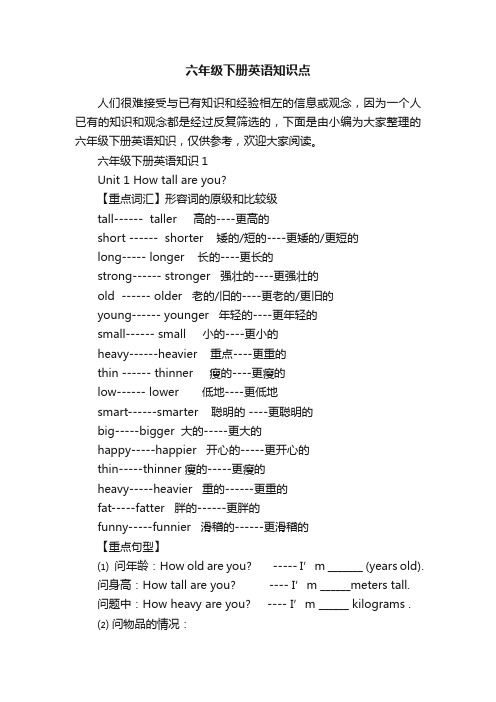
六年级下册英语知识点人们很难接受与已有知识和经验相左的信息或观念,因为一个人已有的知识和观念都是经过反复筛选的,下面是由小编为大家整理的六年级下册英语知识,仅供参考,欢迎大家阅读。
六年级下册英语知识1Unit 1 How tall are you?【重点词汇】形容词的原级和比较级tall------ taller 高的----更高的short ------ shorter 矮的/短的----更矮的/更短的long----- longer 长的----更长的strong------ stronger 强壮的----更强壮的old ------ older 老的/旧的----更老的/更旧的young------ younger 年轻的----更年轻的small------ small 小的----更小的heavy------heavier 重点----更重的thin ------ thinner 瘦的----更瘦的low------ lower 低地----更低地smart------smarter 聪明的 ----更聪明的big-----bigger 大的-----更大的happy-----happier 开心的-----更开心的thin-----thinner 瘦的-----更瘦的heavy-----heavier 重的------更重的fat-----fatter 胖的------更胖的funny-----funnier 滑稽的------更滑稽的【重点句型】⑴问年龄:How old are you? ----- I’m _______ (years old).问身高:How tall are you? ---- I’m ______meters tall.问题中:How heavy are you? ---- I’m ______ kilograms .⑵ 问物品的情况:① How large is your room?你的房间有多大?It’s __________ square meters.有_______ 平方米。
人教部编版六年级下册小学英语知识点思维导图挂图(1-6单元)
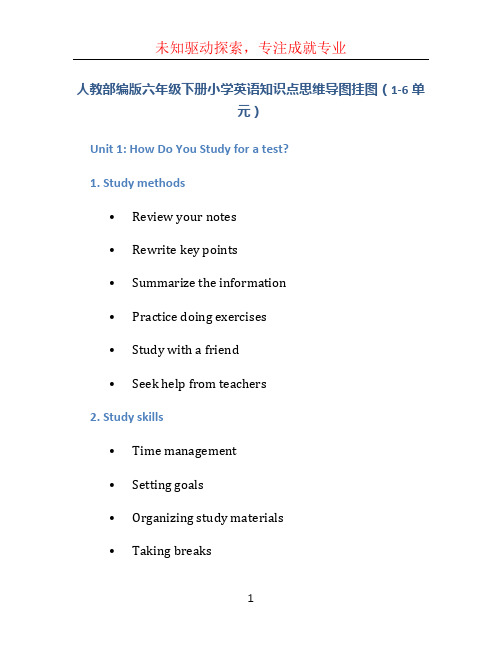
人教部编版六年级下册小学英语知识点思维导图挂图(1-6单元)Unit 1: How Do You Study for a test?1. Study methods•Review your notes•Rewrite key points•Summarize the information•Practice doing exercises•Study with a friend•Seek help from teachers2. Study skills•Time management•Setting goals•Organizing study materials•Taking breaks•Avoiding distractionsUnit 2: What Does He Look Like?1. Physical appearance•Hair color (blond, brown, black)•Eye color (blue, brown, green)•Height (tall, short, medium)•Age (young, old, middle-aged)•Build (slim, chubby, muscular)2. Describing people•Using adjectives (kind, friendly, funny)•Using comparison words (taller than, shorter than)•Using present continuous tense (He is wearing a blue shirt.)•Using possessive pronouns (His sister is tall.)Unit 3: I am more outgoing than my sister.1. Comparatives and Superlatives•Adding -er and -est (taller, tallest)•Doubling the final consonant (bigger, biggest)•Using more and most (more beautiful, most beautiful)•Exceptions and irregular forms (good, better, best) 2. Comparing personalities•Using adjectives (friendly, outgoing, shy)•Using comparatives (more outgoing than, less shy than)•Using superlatives (the most friendly, the least outgoing)Unit 4: What’s the Best Movie Theater?1. Expressing opinions•Using adjectives (good, bad, interesting)•Using comparative adjectives (better, worse, more interesting)•Using superlative adjectives (the best, the worst, the most interesting)2. Asking for opinions•Using question words (What, Which)•Using sentence structure (What is your opinion about…?)•Using polite phrases (Could you tell me…?)Unit 5: Do you Want to Help Clean the City Park?1. Giving and receiving instructions•Using imperatives (Pick up the trash. Plant the flowers.)•Using polite requests (Can you please help me…?)•Using sequencing words (First, then, finally)2. Talking about the environment•Vocabulary related to nature and pollution•Actions to protect the environment (recycle, reduce, reuse)•Discussing the importance of a clean environmentUni t 6: I’m watching TV.1. Present Continuous Tense•Affirmative sentences (I am doing my homework.)•Negative sentences (She is not eating lunch.)•Questions (Are you playing soccer?)•Using time expressions (Right now, at the moment)2. Daily activities•Vocabulary related to daily routines (eat breakfast, brush teeth)•Talking about hobbies and interests•Describing activities using present continuous tense以上是人教部编版六年级下册小学英语知识点思维导图挂图(1-6单元)的概述。
六年级英语下册语法知识点精选全文
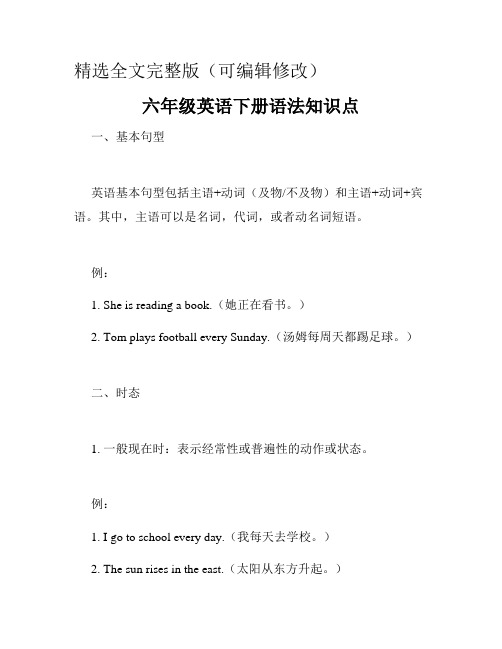
精选全文完整版(可编辑修改)六年级英语下册语法知识点一、基本句型英语基本句型包括主语+动词(及物/不及物)和主语+动词+宾语。
其中,主语可以是名词,代词,或者动名词短语。
例:1. She is reading a book.(她正在看书。
)2. Tom plays football every Sunday.(汤姆每周天都踢足球。
)二、时态1. 一般现在时:表示经常性或普遍性的动作或状态。
例:1. I go to school every day.(我每天去学校。
)2. The sun rises in the east.(太阳从东方升起。
)2. 现在进行时:表示现在正在进行的动作。
例:1. They are playing basketball in the park.(他们正在公园里打篮球。
)2. She is studying for the exam.(她正在为考试学习。
)3. 一般过去时:表示过去发生的动作或状态。
例:1. They visited their grandparents last week.(他们上周拜访了他们的祖父母。
)2. We lived in Paris for two years.(我们在巴黎住了两年。
)三、动词时态的转换动词时态可以通过时态的转换来表达过去、现在和将来的概念。
常见的时态转换有以下几种:1. 一般现在时转换为一般过去时:- am/is/are → was/were- do/does → did- have/has → had例:1. He is a teacher.(他是一名老师。
)→ He was a teacher.(他曾经是一名老师。
)2. They have a dog.(他们有一只狗。
)→ They had a dog.(他们曾经有一只狗。
)2. 一般现在时转换为一般将来时:将动词的原形后加上will。
例:1. She knows the answer.(她知道答案。
六年级英语下册知识点总结

六年级下册知识点总结Unit 1 How Tall Are You?重点单词:Taller, shorter, stronger, older, younger, bigger, heavier, longer, thinner, smaller, funnier, meter, squid, lobster, shark, deep, seal, sperm whale, killer whale 重点句型:1-How tall are you?-I'm 1.60 meters tall/ I'm 160 cm.2-How heavy are you?-I'm 48 kg,-How long are your legs?-76 cm.4 -How big are your feet?-I wear size 17.5 -Who is taller than you?-Tom is taller than me.注:形容词比较级的变化规律:Unit2 What§The Matter,Mike?单词:重点Havea fever, hurt, have a cold, have a toothache, have a headache, have a sore throat, matter, sore, nose, tired, excited, angry, happy, bored, sad, medicine, a little, laugh at重点句型:1 -What's the matter with them?-The robot is tired, the stray man has a headache.-Fine. How are you?-I have a headache / fever / cold / toothache / sore throat.或have the flu.3 -What's the matter, mike?-I feel sick. I have a fever./ My throat is sore, my nose is hurt.4-How does Lisa feel?-She is tired/ sad/happy/excited.5-How are you, Liu Yun? You look sad.-I failed the math test.6-How do you / them feel? /How does he/she feel?-They feel happy./He/She feels happy.Unit 3 Last Weekend重点单词:Watch, wash, clean, play, visit, do, last, weekend, go, to, park, go to swimming, go hiking, go fishing, tongue twister, yesterday, return 重点句型:1-What did you do last weekend/yesterday?-I watched TV / washed the clothes/cleaned the room/played the football/visited grandparents/ played football/went to a park/went swimming/read a book/went fishing/went hiking/-Did you do homework yesterday?-Yes, I did./ No, I didn't.2-What did you do last weekend?-I V-ed……注:动词过去时的变化形式:1、一般情况下,动词词尾加-ed ,如:work ---worked play-played wanted--wanted act --- acted2、以不发音的-e结尾动词,动词词尾加-d,如:live-lived move——moved taste-tasted hope -hoped3、以辅音字母+y结尾的动词,把-y变为-i再加-ed,如:study-studied copy-copied cry-cried carry-carried4、以一个辅音字母结尾的重读闭音节动词,双写词尾辅音字母,再加-ed,如:stop —stopped5、不规则动词的过去式变化规律性不强,须多加记忆。
六年级下册英语知识点归纳总结

六年级下册英语知识点归纳总结一、词汇与短语学习并掌握课本中出现的新词汇,如名词、动词、形容词等。
积累常用短语和固定搭配,如“have to”(不得不)、“be good at”(擅长)、“ask for”(请求)等。
二、时态与语态1.一般现在时:表示经常性、习惯性的动作或状态。
例如:✓She often goes to school by bike. (她经常骑自行车上学。
)✓I like reading books. (我喜欢读书。
)2.现在进行时:表示正在进行的动作。
例如:✓They are playing football now. (他们现在正在踢足球。
)✓Look! The boy is running. (看!那个男孩正在跑。
)3.一般过去时:表示过去某个时间里发生的动作或状态。
例如:✓I saw a movie last night. (我昨晚看了一部电影。
)✓They visited their grandparents last weekend. (他们上周末拜访了祖父母。
)三、语法结构1.主谓宾结构:主语+谓语+宾语。
例如:✓I like apples. (我喜欢苹果。
)2.主系表结构:主语+系动词+表语。
例如:✓She is a beautiful girl. (她是一个漂亮的女孩。
)四、阅读理解✓能够理解短文的基本内容,抓住关键信息。
✓学会根据上下文推测词义。
五、写作✓能够根据图片或提示信息,写出简单的短文。
✓注意使用正确的时态和语法结构。
考试例子:(一)单项选择1.—What did you do last Sunday?—I _______ to the zoo with my family.A. goB. wentC. am goingD. will go【答案】B(二)完形填空阅读短文,从每小题所给的A、B、C、D四个选项中选出可以填入空白处的最佳答案。
One day, a boy named Tom went to the park. He saw a sign near the park's entrance. It said, "No swimming in the lake!" But Tom _______ saw it and he went swimming in the lake.A. neverB. sometimesC. oftenD. always【答案】A(三)阅读理解阅读短文,根据短文内容判断正误,正确的写“T”,错误的写“F”。
部编版六年级英语下册必背必考知识点

部编版六年级英语下册必背必考知识点第一单元:动物朋友们1.1 单词1. zoo:动物园2. tiger:老虎3. elephant:大象4. monkey:猴子5. giraffe:长颈鹿6. lion:狮子7. seal:海豹8. panda:熊猫9. parrot:鹦鹉10. wild:野生的1.2 短语1. go to the zoo:去动物园2. a tall animal:一个高大的动物3. the biggest animal:最大的动物4. a small monkey:一个小猴子5. in the tree:在树上1.3 句型1. What's this?:这是什么?2. What's that?:那是什么?3. It's ...:它是...4. Do you like ...?:你喜欢...吗?5. Yes, I do./No, I don't.:是的,我喜欢./不,我不喜欢。
第二单元:我们的身体2.1 单词1. body:身体2. head:头3. eye:眼睛4. ear:耳朵5. nose:鼻子6. mouth:嘴7. arm:手臂8. hand:手9. leg:腿10. foot:脚2.2 短语1. head and shoulders:头和肩膀2. eyes and ears:眼睛和耳朵3. nose and mouth:鼻子和嘴4. arms and legs:手臂和腿2.3 句型1. I have ...:我有...2. He/She has ...:他/她有...3. Do you have ...?:你有...吗?4. Yes, I do./No, I don't.:是的,我有./不,我没有。
第三单元:颜色和形状3.1 单词1. red:红色2. yellow:黄色3. blue:蓝色4. green:绿色5. black:黑色6. white:白色7. purple:紫色8. orange:橙色9. round:圆的10. square:平方的3.2 短语1. red and yellow:红色和黄色2. blue and green:蓝色和绿色3. black and white:黑色和白色4. purple and orange:紫色和橙色3.3 句型1. What color is it?:它是什么颜色?2. It's ...:它是...3. What shape is it?:它是什么形状?4. It's ...:它是...第四单元:食物和饮料4.1 单词1. apple:苹果2. banana:香蕉3. orange:橙子4. grape:葡萄5. watermelon:西瓜6. pear:梨7. rice:米饭8. noodles:面条9. meat:肉10. egg:鸡蛋4.2 短语1. eat fruit:吃水果2. drink milk:喝牛奶3. have a meal:吃一顿饭4.3 句型1. What do you like?:你喜欢什么?2. I like ...:我喜欢...3. What do you want?:你想要什么?4. I want ...:我想要...第五单元:家庭和朋友5.1 单词1. father:父亲2. mother:母亲3. brother:兄弟4. sister:姐妹5. grandfather:祖父6. grandmother:祖母7. friend:朋友5.2 短语1. my family:我的家人2. your family:你的家人3. his family:他的家人4. her family:她的家人5.3 句型1. Who's this?:这是谁?2. Who's that?:那是谁?3. It's ...:它是...4. Is it ...?:它是...吗?以上是部编版六年级英语下册必背必考知识点的详细内容,希望对大家有所帮助。
- 1、下载文档前请自行甄别文档内容的完整性,平台不提供额外的编辑、内容补充、找答案等附加服务。
- 2、"仅部分预览"的文档,不可在线预览部分如存在完整性等问题,可反馈申请退款(可完整预览的文档不适用该条件!)。
- 3、如文档侵犯您的权益,请联系客服反馈,我们会尽快为您处理(人工客服工作时间:9:00-18:30)。
六下知识点姓名:班级:Unit1 Part A 知识点1.That’ s the tallest dinosaur!那是最高的恐龙tall(高的)→taller (更高的)→tallest(最高的)原级比较级最高级形容词的比较级一般以er结尾,而形容词的最高级大都以est结尾!此外,形容词最高级前面要有定冠词the!2.maybe是一个副词,是一个整体,意为“大概,或许,可能”,常位于句首,修饰后面整个句子,表示不太肯定的猜测,使用时常放在句首;Maybe you are right 也许你是对的Maybe 与may be,二者都是“也许,可能”的意思;May be 是两个词的构成,may 是情态动词,后接谓语动词原形。
You may be right.你也许是对的。
3.both of us 我们两个:Both of us are students 我们两个都是学生4.There are more dinosaurs over there ! 那边有更多的恐龙①many/much(许多)→more(更多的)原级比较级I have more apples.我有更多的苹果。
②over there在那边get/go there去那边come here来这里5..and 和orand ,意为“和”,出现在肯定句当中I like apples and oranges. 我喜欢苹果和橙子。
or,在疑问句中是“或者”的意思,出现在否定句中是“和”的意思What fruit do you like,apple or orange?你喜欢什么水果?苹果或者橙子?I don’t like apple or orange. 我不喜欢苹果和橙子。
Unit1 Part B 知识点1.Those shoes in the window are nice!在窗户里的那些鞋子是很漂亮的!①those(那些)→ that (那个)these(这些)→ this (这个)this,that,these,those是指示代词,它们既可以充当形容词,也可以充当名词;② those shoes in the window 窗户里的那些鞋子in the window是介词短语shoes 是整个句子的主语!2.let ’s have a look!让我们看一看!①Let ’s = let us 让我们,Let sb do sth 让某人做某事Let me sing a birthday song for you 让我为你唱一首英文歌!②have a look看一看,have a try试一试,have a rest休息一下,have a walk散散步3.I wear size 38 shoes. 我穿38码的鞋子①提问:What size are your shoes?你的鞋子是什么码数的?I wear size 38 我穿38码的What color is it?它是什么颜色?What time is it now?现在是什么时间?② wear,动词,意为“穿(衣服);戴(眼镜);留(长发))”等She is wearing a red skirt today. 她今天穿着一件红色的短裙。
My sister wears long hair 我姐姐留着一头长发4.Your feet are bigger than mine. 你的脚比我的脚要大。
① foot(复数)feet 脚goose (复数)geese②mine,名词性物主代词,是名词,意为“我的东西”,这样东西指代前面谈话中刚出现过,在句中,mine = my feet ,我的东西指的是我的脚。
名词性物主代词:mine我的,yours你的/你们的,his他的,hers她的,theirs它们的My hair is longer than yours. 我的头发比你的头发长。
Her eyes are much bigger than ours. 她的眼睛比我们的眼睛大很多。
5.You look taller than me. 你看起来比我更高。
改为一般疑问句:Do I look taller than you?改为否定句:You don’t look taller than me.6.But I think you are heavier. 但我认为你更重一点。
I think我认为,表主观推测I think we should finish homework before watching TV.我认为我们应该完成作业再看电视。
I think she is very pretty. 我认为她很漂亮。
Unit1 Read and write知识点1、单词和短语:countryside乡村,lower更低的,smarter更聪明的,shadow阴影;影子,grow变得;生长,become开始变得;变成, go down下沉2、little duck is watching the sun go down小鸭子正在看太阳往下沉(即日落)① is watching = be + 动词ing,现在进行时,正在做某事,“正在看”② watch sb do sth 看某人做某事I watch you play on the playground 我看见你在操场上玩耍3、It is getting lower and lower 太阳越来越低His shadow is getting longer and longer 他的影子越来越长比较级+ and +比较级,表示“越来越......”Her hair is longer and longer 她的头发越来越长了He is taller and taller 他越来越高了4、You are becoming a big beautiful bird!你将变成一只美丽的大鸟!句子中“be动词+现在分词”表将来的含义。
英语中有一类动词的现在进行时可表示将来的含义,如go,come,leave等,它们的现在进行时态往往不表示这个动作正在进行,而表示动作将要发生。
We’re going to Wuhan tomorrow.我们明天去武汉。
The bus is coming!公共汽车就要来了。
They’re leaving.他们马上要走了。
Unit1 Part C story time知识点单词:goalkeeper守门员,centimeter厘米,catch接住,赶上,catch the ball 接球,reach到达,伸手,够得着,teamwork团队合作,配合,guy家伙,男人,almost差不多,几乎,goal球门,excellent极好的,优秀的,happen 发生1、I’d like to have a try ①have a try 试一试② I ’d like = I would like动作作宾语时:would like to do sth = want to do sth 想要做某事......I would like to have fish and rice for dinner. = I want to have fish and rice for dinner.我晚餐想要吃鱼肉和米饭。
名词作宾语时:would like sth = want sth 想要某物I would like some apples. = I want some apples. 我想要一些苹果。
2、Mr Zebra is 10 centimetres taller than Mr Deer. 斑马先生比鹿先生高10厘米。
A+ be 动词+数字+计量单位+形容词比较级+ than + BHe is twelve centimeters taller than me.他比高我高12厘米。
Mike is 3 kilograms heavier than John. 麦克比约翰重三公斤。
3、I’m the tallest one. 我是最高的那一个4、Here is the one we want!这个就是我们想要的!5、I can’t wait.我等不及了。
can’t wait to do sth 迫不及待想要做某事I can’t wait to go and see our new classroom.我迫不及待想去看看我们的新教室。
wait for 等待+名词或代词作宾语I will wait for you at the gate.我将在门口等你。
6、The others can’t reach you.其他人够不着你。
the others相当于the other的复数形式,表示特定范围内的“其他人或物”比较级的构成规则1.单音节和少数双音节形容词的比较级的构成规则:①一般直接在形容词的词尾加ertall→taller, short →shorter, long→longer②在以字母e结尾的形容词后加rlarge→larger, nice→nicer, late→later③以重读闭音节结尾的形容词,且词尾只有一个辅音字母的词,先双写这个辅音字母,再加erthin→thinner, big→bigger, fat→fatter④以辅音字母+y结尾的形容词,把y改为i,再加erbusy→busier, heavy→heavier, easy→easier2.多音节和大多数双音节形容词的比较级通常在前面加more beautiful→more beautiful, interesting→more interesting, careful→more careful3.不规则变化good/well→better, bad/badly→worse, many/much→more, little→lessfar→farther或further,old→older或elder比较级口诀记忆:前有甲、后有乙,中间来个比较级。
比较级前用个be,比较级后用个比(than)。
原级变成比较级,er结尾要牢记。
一般直接加er,单辅重闭双写加er。
辅音加y把y变i加er,以e结尾直接加r。
多数双音多音节,词前加more就可以。
不规则词没几个,它们需要特殊记。
Unit1 单元复习知识点1.如何询问人或物的高度:句型:How tall+be动词+人/物?--(人/物+be动词+)数字+长度单位(+tall).如:How tall is your younger brother?你弟弟多高?--He is 1.65 metres tall.他身高1.65米。
